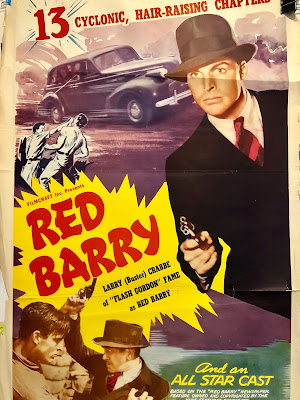This post is, partially, motivated by President Trump’s speech to the UN a few days ago although it is also intended to mark the (forthcoming) 80th anniversary of one of Buster Crabbe’s best, if somewhat neglected, serials. While not as flamboyant or creative as Flash Gordon (1936), it is certainly a better serial than the two Flash Gordon sequels.
Red Barry is a rare serial as it directly addresses a contemporary issue in American politics. This involved the issue of active participation by the US in overseas events. And it supports one side of the debate - the one taken by President Roosevelt.
The serial was released during a turbulent period in American history, a time when American isolationism prevailed. It was also a time when the White House covertly worked against isolationist sentiments. This issue, a perennial in American politics, was raised in a slightly different form when Trump recently told the UN that the US was against globalism and for patriotism (America First), a reverse on the stance adopted by Roosevelt 80 years earlier.
The 1935 Neutrality Act forms a key component of the serial. This was a decision taken by Congress, following extensive American casualties during the First World War, to impose an embargo on trading arms and war materials with parties at war. In 1936 this prohibition was extended to loans and credits - this extension provides the basis for the plot of the serial. However, when the Second Sino-Japanese War erupted on July 7, 1937, with Japan invading China, President Roosevelt was determined to circumvent the Neutrality Act and allow British ships to carry American arms to help the Chinese fight the Japanese. This action outraged isolationist politicians in Congress. Undeterred, Roosevelt in his Quarantine Speech on October 5, 1937, placed a “moral embargo” on the export of aircraft to Japan.
Red Barry’s plot, based on the tussle for two million dollars worth of bonds between Chinese nationalists, a Russian ballerina and a Eurasian gangster, clearly endorses Roosevelt’s support for China. During its 13 chapters the bonds pass through many hands with police detective Red Barry (Buster Crabbe) in hot pursuit.
Red Barry’s plot, based on the tussle for two million dollars worth of bonds between Chinese nationalists, a Russian ballerina and a Eurasian gangster, clearly endorses Roosevelt’s support for China. During its 13 chapters the bonds pass through many hands with police detective Red Barry (Buster Crabbe) in hot pursuit.
 |
| Wade Boteler, Larry (Buster) Crabbe, Red Barry |
While not a flawless serial, there are a couple of interesting plot twists late in the serial. There is also a wonderful parody of the “Philo Vance” prototype of amateur detectives, a popular literary and filmic character in the late 1920s and early 1930s before the hardboiled variety took over. As an added bonus, the recap passages at the beginning of each chapter represent the finest example of the detailed comic strip drawings employed by Universal in the mid and late 1930s.
And the usual plug - anybody interested in more information on Red Barry, Buster Crabbe or the Universal serials please consult my Encyclopaedia of American Film Serials (McFarland, 2017) Click on the title for a link to Amazon, cover below) as there are long entries on each serial.


No comments:
Post a Comment
Note: only a member of this blog may post a comment.